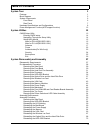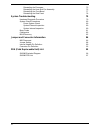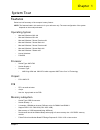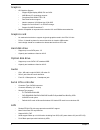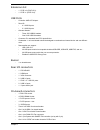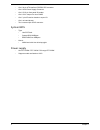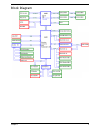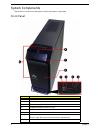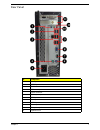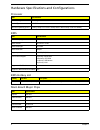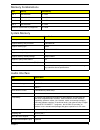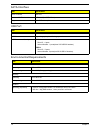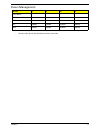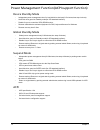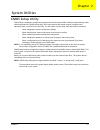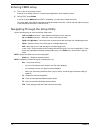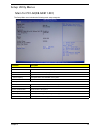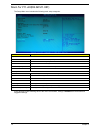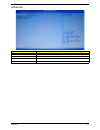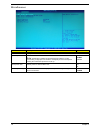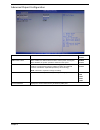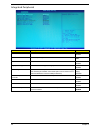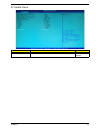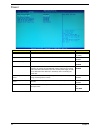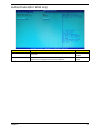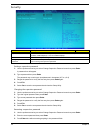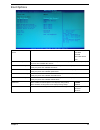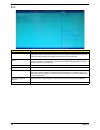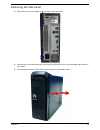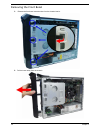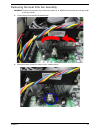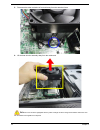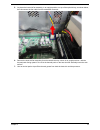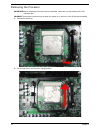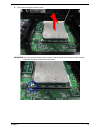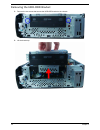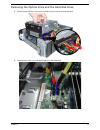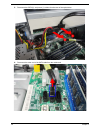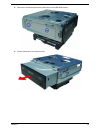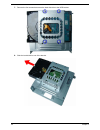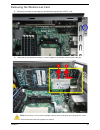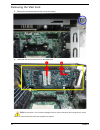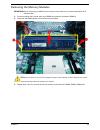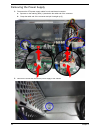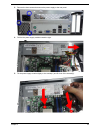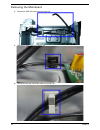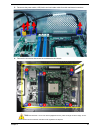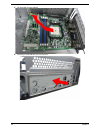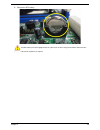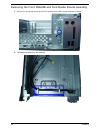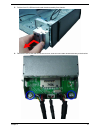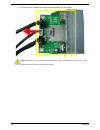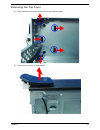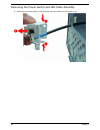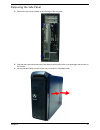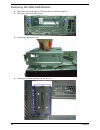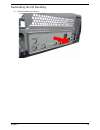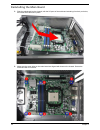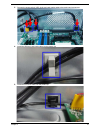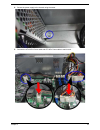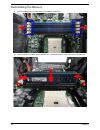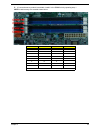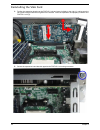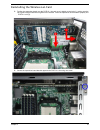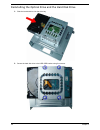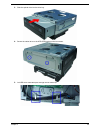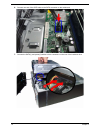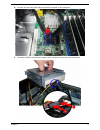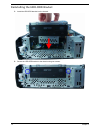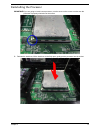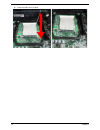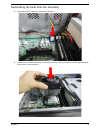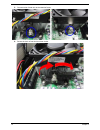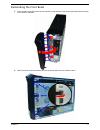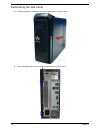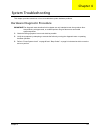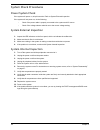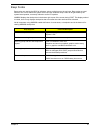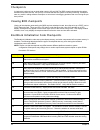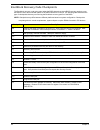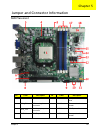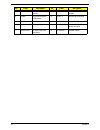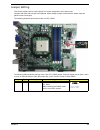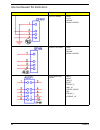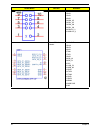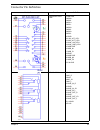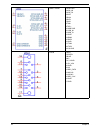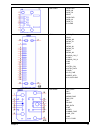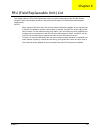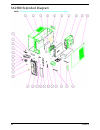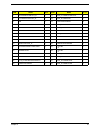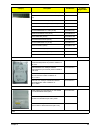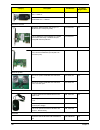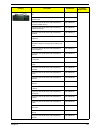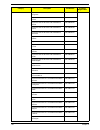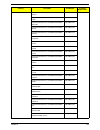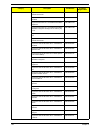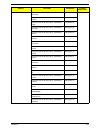- DL manuals
- Acer
- Gateway
- SX2830
- Service Manual
Acer SX2830 Service Manual - Table of Contents
vii
System Tour
1
Features
1
Block Diagram
5
System Components
6
Front Panel
6
Rear Panel
7
Hardware Specifications and Configurations
8
Power Management Function(ACPI support function)
12
System Utilities
13
CMOS Setup Utility
13
Entering CMOS setup
14
Navigating Through the Setup Utility
14
Setup Utility Menus
15
Main for P01-A0(DB.GDE11.001)
15
Main for P11-A0(DB.GDS11.001)
16
Advance
17
Power
22
Authentication(For Win8 only)
23
Security
24
Boot options
25
Exit
26
System Disassembly and Assembly
27
Disassembly Requirements
27
Pre-disassembly Procedure
28
Removing the Side Panel
29
Removing the Front Bezel
30
Removing the Heat Sink Fan Assembly
31
Removing the Processor
34
Removing the HDD-ODD Bracket
36
Removing the Optical Drive and the Hard Disk Drive
37
Removing the Wireless Lan Card
41
Removing the VGA Card
42
Removing the Memory Modules
43
Removing the Power Supply
44
Removing the Mainboard
46
Removing the Front I/O&USB and Card Reader Boards Assembly
50
Removing the Top Cover
53
Removing the Power Switch and LED Cable Assembly
54
Assembly Requirements
55
Assembly Procedure
56
Removing the Side Panel
57
Removing the HDD-ODD Bracket
58
Reinstalling the I/O Shielding
59
Reinstalling the MainBoard
60
Reinstalling the Power Supply
62
Reinstalling the Memory
64
Reinstalling the VGA Card
66
Reinstalling the Wireless Lan Card
67
Reinstalling the Optical Drive and the Hard Disk Drive
68
Reinstalling the HDD-ODD Bracket
72
Table of Contents
Summary of SX2830
Page 1
Gateway sx2830 service guide sg v1.01 printed in taiwan.
Page 2: Revision History
Ii revision history please refer to the table below for the updates made on this service guide. Date version chapter updates 04-25-2012 first draft 04-26-2012 v1.00 08-20-2012 v1.01 1,2,6 phase in win8 operation system, and update related information on page1, 15, 16, 98..
Page 3: Copyright
Iii copyright copyright © 2012 by acer incorporated. All rights reserved. No part of this publication may be reproduced, transmitted, transcribed, stored in a retrieval system, or translated into any language or computer language, in any form or by any means, electronic, mechanical, magnetic, optica...
Page 4: Disclaimer
Iv disclaimer the information in this guide is subject to change without notice. Acer incorporated makes no representations or warranties, either expressed or implied, with respect to the contents hereof and specifically disclaims any warranties of merchantability or fitness for any particular purpo...
Page 5: Conventions
V conventions the following conventions are used in this manual: screen messages denotes actual messages that appear on screen. Note gives additional information related to the current topic. Warning alerts you to any physical risk or system damage that might result from doing or not doing specific ...
Page 6: Service Guide Coverage
Vi service guide coverage this service guide provides you with all technical information relating to the basic configuration decided for acer's "global" product offering. To better fit local market requirements and enhance product competitiveness, your regional office may have decided to extend the ...
Page 7: Table of Contents
Vii system tour 1 features 1 block diagram 5 system components 6 front panel 6 rear panel 7 hardware specifications and configurations 8 power management function(acpi support function) 12 system utilities 13 cmos setup utility 13 entering cmos setup 14 navigating through the setup utility 14 setup ...
Page 8
Viii reinstalling the processor 73 reinstalling the heat sink fan assembly 75 reinstalling the front bezel 77 reinstalling the side panel 78 system troubleshooting 79 hardware diagnostic procedure 79 system check procedures 80 power system check 80 system external inspection 80 system internal inspe...
Page 9
Chapter 1 1 features below is a brief summary of the computer’s many feature: note: the features listed in this section is for your reference only. The exact configuration of the system depends on the model purchased. Operating system • microsoft windows 8 ml x64 • microsoft windows 8 sl x64 • micro...
Page 10
2 chapter 1 graphics • hd graphics support: • support digital display hdmi, dvi and vga. • amd blu-ray 3d technology support . • complicant with hdmi cts v1.4a. • dual view function support. • need to measure vga follow acer vga sop. • support for cool'n'quiet™ via fid/vid change. • support for amd ...
Page 11
Chapter 1 3 extension slot • 1 * pcie x16 (pcie v2.0). • 1 * pcie x1 (pcie v2.0). Usb ports • controller: amd a75 chipset. • rear i/o: • 4 * usb2.0 ports. • 2 * usb3.0 ports. • onboard header: • three 2x5 usb2.0 headers. • one 2x10 usb3.0 headers. • connector pin: standard intel fpio pin definition....
Page 12
4 chapter 1 • one* 24 pin atx interface ps3/ps2 sps connector • one* h2x2 power supply connector • one* h7x2 pin front panel io header • one* h3x1 jumper for clear cmos • one* 3 pin ir receiver header to super i/o • one* on board buzzer • two* reserved 2pin gpio connector system bios • type: • use s...
Page 13
Chapter 1 5 block diagram.
Page 14
6 chapter 1 system components this section is a virtual tour of the system’s interior and exterior components. Front panel no. Component 1 gateway logo 2 usb 2.0 ports 3 card reader slot(sd/sdhc/mmc/plus) 4 headphone/speaker-out/line-out jack 5 microphone-in jack 6 optical drive 7 optical drive ejec...
Page 15
Chapter 1 7 rear panel no. Component 1 line-in jack 2 usb 3.0 ports 3 rj45 lan connector 4 ps2 mouse port 5 power connector 6 ps2 keyboard port 7 hdmi port 8 d-sub port 9 usb 2.0 ports 10 line-out jack 11 microphone jack 12 expansion slot.
Page 16
8 chapter 1 hardware specifications and configurations processor bios bios hotkey list main board major chips item specification processor type amd virgo 65w and 100w cpu socket type amd fm2 minimum operating speed 0 mhz (if stop cpu clock in sleep state in bios setup is set to enabled.) item specif...
Page 17
Chapter 1 9 memory combinations system memory audio interface slot memory total memory slot 1 1gb,2gb,4gb 1g ~4gb slot 2 1gb,2gb,4gb 1g ~4gb slot 3 1gb,2gb,4gb 1g ~4gb slot 4 1gb,2gb,4gb 1g ~4gb maximum system memory supported 1g~16gb item specification memory slot number 4 slot support memory size ...
Page 18
10 chapter 1 sata interface usb port environmental requirements item specification sata controller amd a75 number of sata channel sataiii x 3(3 * sata 6gb/s) support mode ahci/ide mode option item specification universal hci usb 3.0/2.0/1.1 usb class support legacy keyboard for legacy mode usb conne...
Page 19
Chapter 1 11 power management • devices wake up from s3 should be less than. • devices wake up from s5 should be less than 10 seconds. Devices s1 s3 s4 s5 power button v v v v usb keyboard/mouse v v n/a n/a pme disabled disabled disabled disabled rct disabled disabled disabled disabled wor disabled ...
Page 20
12 chapter 1 power management function(acpi support function) device standby mode • independent power management timer for hard disk drive devices(0-15 minutes,time step=1minute). • hard disk drive goes into standby mode(for ata standard interface). • disable v-sync to control the vesa dpms monitor....
Page 21
Chapter 2 13 cmos setup utility cmos setup is a hardware configuration program built into the system rom, called the complementary metal- oxide semiconductor (cmos) setup utility. Since most systems are already properly configured and optimized, there is no need to run this utility. You will need to...
Page 22
14 chapter 2 entering cmos setup 1. Turn on the server and the monitor. If the server is already turned on, close all open applications, then restart the server. 2. During post, press delete. If you fail to press delete before post is completed, you will need to restart the server. The setup main me...
Page 23
Chapter 2 15 setup utility menus main for p01-a0(db.Gde11.001) the setup main menu includes the following main setup categories. Parameter description system bios version version number of the bios setup utility. Build date date when the bios setup utility was built processor type of cpu installed o...
Page 24
16 chapter 2 main for p11-a0(db.Gds11.001) the setup main menu includes the following main setup categories. In the descriptive table following each of the menu screenshots, settings in boldface are the default and suggested settings. Parameter description system bios version version number of the b...
Page 25
Chapter 2 17 advanced parameter description miscellaneous press enter to access the miscellaneous submenu advanced chipset configuration press enter to access the advanced chipset configuration submenu integrated peripherals press enter to access the integrated peripherals submenu pc health status p...
Page 26
18 chapter 2 miscellaneous parameter description option ahci port0/1/2 displays the status of auto detection of the ahci device. Spread spectrum enables or disables the reduction of the mainboard’s emi. Note: remember to disable the spread spectrum feature if you are overclocking. A slight jitter ca...
Page 27
Chapter 2 19 advanced chipset configuration amd turbo core enables or disables amd turbo core technology. Enabled disabled amd cooler’n’quiet when enabled, this feature allows the os to reduce power consumption. When disabled, the system operates at maximum cpu speed. Enabled disabled amd-v enables ...
Page 28
20 chapter 2 integrated peripherals parameter description option onboard sata controller enables or disables the onboard sata controller. Enabled disabled onboard sata mode select an operating mode for the onboard sata. Native ide ahci onboard usb controller enables or disables the onboard usb contr...
Page 29
Chapter 2 21 pc health status parameter description option smart fan enables or disables the smart system fan control function. Enabled disabled.
Page 30
22 chapter 2 power parameter description option acpi suspend mode select an acpi state. S3 (str) s1 (pos) deep power off mode select the deep power off mode enabled disabled rtc wakeup support enables or disables to wake up the system by rtc alarm function enabled disabled power on by pcie devices t...
Page 31
Chapter 2 23 authentication(for win8 only) parameter description option secure boot secure boot flow control, secure boot is possible only if system rens in user mode. Enabled disabled secure boot mode when standard, fixed secure boot policy. When custom, changeable secure boot key databases. Standa...
Page 32
24 chapter 2 security setting a supervisor password 1. Use the up/down arrow keys to select change supervisor password menu then press enter. A password box will appear. 2. Type a password then press enter. The password may consist up to six alphanumeric characters (a-z, a-z, 0-9) 3. Retype the pass...
Page 33
Chapter 2 25 boot options 1st/2nd/3rd/4th/5th boot device specifies the boot order from the available devices. Efi hard disk cd^dvd removable device lan efi device priority press enter to access the efi device priority submenu and specify the boot device priority sequence from available efi devices....
Page 34
26 chapter 2 exit parameter description save & exit setup when you have completed the system configuration changes, select this option to leave the bios setup utility and reboot the computer, so the new system configuration parameters can take effect. Select save & exit setup from the exit menu and ...
Page 35
Chapter 3 27 this chapter contains step-by-step procedures on how to disassemble and assembly the desktop computer for maintenance and troubleshooting. Disassembly requirements to disassemble the computer, you need the following tools: • wrist grounding strap and conductive mat for preventing electr...
Page 36
28 chapter 3 pre-disassembly procedure before proceeding with the disassembly procedure, perform the steps listed below: 1. Turn off the system and all the peripherals connected to it. 2. Unplug the power cord from the power outlets. 3. Unplug the power cord from the system. 4. Unplug all peripheral...
Page 37
Chapter 3 29 removing the side panel 1. Remove the two screws located on the rear edge of the side panel. 2. Slide the side panel toward the back of the chassis until the tabs on the cover disengage with the slots on the chassis. 3. Lift the side panel away from the server and put it aside for reins...
Page 38
30 chapter 3 removing the front bezel 1. Release the front bezel retention tabs from the chassis interior. 2. Pull the bezel away from the chassis..
Page 39
Chapter 3 31 removing the heat sink fan assembly warning: the heat sink becomes very hot when the system is on. Never touch the heat sink with any metal or with your hands. 1. Loosen the hook of heat sink as shown below. 2. Disconnect tache of heat sink away from the retention frame..
Page 40
32 chapter 3 3. Disconnect the other end tache of heat sink away from the retention frame. 4. Lift the heat sink fan assembly away from the mainboard. Note :cpu fan has been highlighted with the yellow rectangle as above image shows.Please detach the cpu fan and follow local regulations for disposal...
Page 41
Chapter 3 33 5. Lay down the heat sink fan assembly, in an upright position, on top of the optical drivey, as shown below, then disconnect the fan cable from the mainboard connector. 6. Remove the heat sink fan assembly from the chassis then lay it down in an upright position—with the thermal patch ...
Page 42
34 chapter 3 removing the processor important: before removing a processor from the mainboard, make sure to create a backup file of all important data. Warning: the processor becomes very hot when the system is on. Allow it to cool off first before handling. 1. Release the load lever. 2. Lift the lo...
Page 43
Chapter 3 35 3. Pull out the processor from the socket. Important: if you are going to install a new processor, note the arrow on the corner to make sure the processor is properly oriented over the socket..
Page 44
36 chapter 3 removing the hdd-odd bracket 1. Remove the two screws that secure the hdd-odd bracket to the chassis. 2. Lift the bracket up..
Page 45
Chapter 3 37 removing the optical drive and the hard disk drive 1. Disconnect the sata (1) and power (2) cables from the rear of the hard disk drive. 2. Disconnect the other end of the sata cable from the mainboard..
Page 46
38 chapter 3 3. Disconnect the sata (2) and power (1) cables from the rear of the optical drive. 4. Disconnect the other end of the sata cable from the mainboard..
Page 47
Chapter 3 39 5. Remove the screws that secure the optical drive to the hdd-odd bracket. 6. Pull the optical drive out of the drive bay..
Page 48
40 chapter 3 7. Remove the four screws that secure the hard disk drive to the hdd bracket. 8. Slide the hard disk drive out of the bracket..
Page 49
Chapter 3 41 removing the wireless lan card 1. Remove the screw from the expansion board bracket opposite the pcie1x 1 slot. 2. Gently pull up the expansion board (1), move it slightly to the left and remove (2) from the slot. Note: circuit boards >10 cm² has been highlighted with the yellow rectang...
Page 50
42 chapter 3 removing the vga card 1. Remove the screws that secures the card to the chassis. 2. Gently pull the card to remove it from the mainboard. Note: circuit boards >10 cm² has been highlighted with the yellow rectangle as above image shows. Please detach the circuit boards and follow local r...
Page 51
Chapter 3 43 removing the memory modules important: before removing any dimm from the memory board, make sure to create a backup file of all important data. 1. Press the holding clips on both sides of the dimm slot outward to release the dimm(1). 2. Gently pull the dimm upward to pull it away from t...
Page 52
44 chapter 3 removing the power supply 1. Disconnect the atx power supply cables from its mainboard connector. A. Squeeze on the retaining latch (1) attached to the cable end of the connector. B. Grasp the cable end of the connector and pull it straight up (2). 2. Remove the screw that secures the p...
Page 53
Chapter 3 45 3. Remove the three screws that secure the power supply to the rear panel. 4. Pull the the power supply module toward the right. 5. Tilt the power supply module slightly to the outside(1) and lift it out of the chassis(2)..
Page 54
46 chapter 3 removing the mainboard 1. Release the hdd data cable from the metal clip. 1. Release the audio cable from plastic clip. 2. Releas the usb and card reader cable from plastic clip..
Page 55
Chapter 3 47 3. Dsconnect the power switch, usb, audio and card reader cable from their mainboard connectors. 4. Remove the six screws that secure the mainboard to the chassis. Note: circuit boards >10 cm² has been highlighted with the yellow rectangle as above image shows. Please detach the circuit...
Page 56
48 chapter 3 5. Lift the board from the chassis. 6. Punching in io shield then you can remove it..
Page 57
Chapter 3 49 7. Remove the rtc battery. Note:rtc battery has been highlighted with the yellow circle as above image shows.Please detach the rtc battery and follow local regulations for disposal..
Page 58
50 chapter 3 removing the front i/o&usb and card reader boards assembly 1. Remove the screw that secure the front i/o, usb and card reader boards assembly to chassis. 2. Release these cables from the metal clip..
Page 59
Chapter 3 51 3. Pull the front i/o, usb and card reader boards assembly from chassis. 4. Remove the two screws that secure the front i/o, usb and card reader boards assembly to the bracket..
Page 60
52 chapter 3 c. Pull tthe front i/o, usb and card reader boards assembly out of the bracket. Note: circuit boards >10 cm² has been highlighted with the yellow rectangle as above image shows. Please detach the circuit boards and follow local regulations for disposal..
Page 61
Chapter 3 53 removing the top cover 1. Gently release the top bezel retention tabs from the chassis interior. 2. Pull the top cover away from the chassis..
Page 62
54 chapter 3 removing the power switch and led cable assembly 1. Release the two locking tabs (1) and gently pull the power switch and led cable out (2)..
Page 63
Chapter 3 55 assembly requirements to assemble the computer, you need the following tools: • wrist grounding strap and conductive mat for preventing electrostatic discharge • flat-blade screwdriver • philips screwdriver • hex screwdriver • plastic flat-blade screwdriver • plastic tweezers note: the ...
Page 64
56 chapter 3 assembly procedure before proceeding with the assembly procedure, perform the steps listed below: 1. Turn off the system and all the peripherals connected to it. 2. Unplug the power cord from the power outlets. 3. Unplug the power cord from the system. 4. Unplug all peripheral cables fr...
Page 65
Chapter 3 57 removing the side panel 1. Remove the two screws located on the rear edge of the side panel. 2. Slide the side panel toward the back of the chassis until the tabs on the cover disengage with the slots on the chassis. 3. Lift the side panel away from the server and put it aside for reins...
Page 66
58 chapter 3 removing the odd-hdd bracket 1. Remove the front bezel.(refer to “removing the front bezel” on page 27). 2. Remove the two screws from chassis. 3. Lift the cage up and turn it over. 4. Punching in pci shelf slice then you can remove it..
Page 67
Chapter 3 59 reinstalling the i/o shielding 1. Install i/o shielding into chassis..
Page 68
60 chapter 3 reinstalling the main board 1. Slide the mainboard into the chassis, with the i/o ports of the mainboard extruding from their port holes, then lower the mainboard in place. 2. Make sure the screw holes on the main board are aligned with those on the chassis. Secure the mainboard with fo...
Page 69
Chapter 3 61 3. Connect the power switch, usb, audio and card reader cable to the main board connectors. 4. Install the usb and card reader cable into the plastic clip. 5. Install the front audio cable into the plastic clip..
Page 70
62 chapter 3 reinstalling the power supply 1. Slide the power supply module into the chassis and tilt to the inside. 2. Push the power supply module toward the left, with the power connector extruding from the rear panel. 3. Secure the power supply to the rear panel using three screws..
Page 71
Chapter 3 63 4. Secure the power supply to the chassis using the screw. 5. Connect the atx 24pin power cable and atx 4pin power cable to main board..
Page 72
64 chapter 3 reinnstalling the memory 1. Open the holding clips on both sides of the dimm slot outward. 2. Insert the memory module into the dimm1 slot (1) and then press it down until it clicks into place (2)..
Page 73
Chapter 3 65 3. If a second memory module is available, install it in the dimm2 slot by repeating step 1. Note: install memory rule as table shown below. Dimm1 dimm3 dimm2 dimm4 a a a a b b a b a a a a b a a a a a a b a b remark:a and b show different size of memory, size:a>b.
Page 74
66 chapter 3 reinstalling the vga card 1. Position the expansion board over the pcie16x 1 slot and move it slightly to the right (1), making sure the card guide is aligned with the slot guide on the chassis. Insert the expansion card properly connector into pcie16x 1 slot (2). 2. Secure the expansio...
Page 75
Chapter 3 67 reinstalling the wireless lan card 1. Position the expansion board over the pcie1x 1 slot and move it slightly to the right (1), making sure the card guide is aligned with the slot guide on the chassis. Insert the expansion card connector properly into pcie1x 1 slot (2). 2. Secure the...
Page 76
68 chapter 3 reinstalling the optical drive and the hard disk drive 1. Slide the hard disk drive into the drive bay. 2. Secure the hard disk drive to the hdd-odd bracket using four screws..
Page 77
Chapter 3 69 3. Slide the optical drive into the drive bay. 4. Secure the optical drive to the hdd-odd bracket using two screws. 5. Let hdd sata data cable pass through the two metal clip..
Page 78
70 chapter 3 6. Connect one end of the sata cable to the sata connector on the mainboard. 7. Connect the sata(1) and power(2) cables to their connectors on the rear of the hard disk drive..
Page 79
Chapter 3 71 8. Connect one end of the sata cable to the sata connector on the mainboard. 9. Connect the sata(1) and power(2) cables to their connectors on the rear of the optical drive..
Page 80
72 chapter 3 reinstalling the hdd-odd bracket 1. Install the hdd-odd bracket into the chassis. 2. Secure the hdd-odd bracket to the chassis using two screws..
Page 81
Chapter 3 73 reinstalling the processor important: if you are going to install a new processor, note the arrow on the corner to make sure the processor is properly oriented over the socket. 1. Release the load lever, lift the load lever to the fully open, gently put the processor into the socket..
Page 82
74 chapter 3 2. Close the load lever to its latch..
Page 83
Chapter 3 75 reinstalling the heat sink fan assembly 1. Connect the cooler cable to the main board connector. 2. Position the heat sink fan assembly on top of the processor, making sure the screws are aligned with the screw holes on the main board..
Page 84
76 chapter 3 3. Connect tache of heat sink to the retention frame. 4. Secure the hook of heat sink as shown below..
Page 85
Chapter 3 77 reinstalling the front bezel 1. Insert the tabs on the front bezel into the notches on the left side of the chassis and attach the front bezel in the direction indicated. 2. Make sure the front bezel retention tabs are securedly fastened to the chassis interior..
Page 86
78 chapter 3 reinstalling the side panel 1. Push the side panel toward the front of the chassis until it is firmly closed. 2. Secure the side panel to the rear edge of the chassis using two screws..
Page 87
Chapter 4 79 this chapter provides instructions on how to troubleshoot system hardware problems. Hardware diagnostic procedure important: the diagnostic tests described in this chapter are only intended to test acer products. Non- acerproducts, prototype cards, or modified options can give false err...
Page 88
80 chapter 4 system check procedures power system check if the system will power on, skip this section. Refer to system external inspection. If the system will not power on, do the following: • check if the power cable is properly connected to the system and ac source. • check if the voltage selecto...
Page 89
Chapter 4 81 beep codes beep codes are used by the bios to indicate a serious or fatal error to the end user. Beep codes are used when an error occurs before the system video has been initialized. Beep codes will be generated by the system board speaker, commonly referred to as the pc speaker. Amibi...
Page 90
82 chapter 4 checkpoints a checkpoint is either a byte or word value output to i/o port 80h.The bios outputs checkpoints throughout bootblock and power-on self test (post) to indicate the task the system is currently executing. Checkpoint sare very useful in aiding software developers or technicians...
Page 91
Chapter 4 83 da restore cpuid value back into register. Give control to bios post (executepostkernel). See post code checkpoints section of document for more information. Dc system is waking from acpi s3 state. E1-e8 ec- ee oem memory detection/configuration error. This range is reserved for chipset...
Page 92
84 chapter 4 bootblock recovery code checkpoints the bootblock recovery code gets control when the bios determines that a bios recovery needs to occur because the user has forced the update or the bios checksum is corrupt. The following table describes the type of checkpoints that may occur during t...
Page 93
Chapter 4 85 bios recovery amibios supports a "recovery flash" mode, which can be used to flash update a bios from the boot block. This is used to update a bios image without the need to boot to an operating system. The following is the process that user should follow to flash bios rom. 1. Put the a...
Page 94
Chapter 5 86 m/b placement no label description no label description 1 cpu socket amd fm2 2 dimm1~4 240-pin ddr3 sdram slots 3 cpu_fan cpu cooling fan connector 4 pwmic firmware download header 5 atx_12v auxiliary 4-pin power connector 6 pciex1 pci express x1 slot 7 pciex16 pci express x16 slot 8 au...
Page 95
87 chapter 5 9 usb3.0 front panel usb3.0 header 10 usb2.0 front panel usb2.0 header 11 panel front panel switch/ led header 12 sata1~3 serial ata connectors 13 gpio gpio 1x2 pin 14 clr_cmos clear coms jumper 15 debug port debug card 16 atx_power standard 24-pin atx power connector 17 system fan syst...
Page 96
Chapter 5 88 jumper setting this section explains how to set the jumper for correct configuration of the main board. Jumpers with more than one pin are numbered. When setting a jumper, ensure that the jumper caps are placed on the correct pins. The following illustration shows the location of clr_cm...
Page 97
89 chapter 5 internal header pin definition header name function definition cpu fan header 1:gnd 2:+12v 3:sense 4:pwm control system fan header 1:gnd 2:+12v 3:sense 4:pwm control front panel audio header 1:mic_l 2:gnd 3:mic_r 4:pwr 5:front_r 6:mic_jd 7:front_sence 8:nc 9:front_l 10:front_jd.
Page 98
Chapter 5 90 front panel header 1:nc 2:gnd 3:sb5v 4:lan led 5:nc 6:nc 7:pwr rst control 8:gnd 9:gnd 10:pwr btn control 11:sata led 12:gnd 13:vcc 14:vcc5 for hdd led front usb header 1:nc 2:gnd 3:gnd 4:gnd 5:usb0_xp 6:usb1_xp 7:usb0_xn 8:usb1_xn 9:usbvcc_0 10:usbvcc_0 front usb header 1:nc 2:gnd 3:gn...
Page 99
91 chapter 5 front usb header 1:nc 2:gnd 3:gnd 4:gnd 5:usb0_xp 6:usb1_xp 7:usb0_xn 8:usb1_xn 9:usbvcc_2 10:usbvcc_2 front usb3.0 header 1:usb pwr 2:rxn1 3:rxp1 4:gnd 5:txn1 6:txp1 7:gnd 8:usb_n1 9:usb_p1 10:oc 11:usb_p2 12:usb_n2 13:gnd 14:txp2 15:txn2 16:gnd 17:rxp2 18:rxn2 19:usb pwr 20:nc header ...
Page 100
Chapter 5 92 connector pin definition header name function definition rj45 and 2 port usb 1:lan pwr 2:mdi0+ 3:mdi0- 4:mdi1+ 5:mdi1- 6:mdi2+ 7:mdi2- 8:mdi3+ 9:mdi3- 10:gnd 11:lan_act_led- 12:lan_act_led+ 13:link_100_ledj 14:link_1000_ledj 15:usb pwr 16:usb_n1 17:usb_p1 18:gnd 19:usb pwr 20:usb_n0 21:...
Page 101
93 chapter 5 usb3.0 conn 1:usb pwr 2:usb_n0 3:usb_p0 4:gnd 5:rxn1 6:rxp1 7:gnd 8:txn1 9:txp1- 10:usb pwr 11:usb_n1 12:usb_p1 13:gnd 14:rxn2 15:rxp2 16:gnd 17:txn2 18:txp2 19~22:gnd d-sub 1:red 2:green 3:blue 4:nc 5,6,7,8:gnd 9:+5v_vga 10:gnd 11:nc 12:ddc_data 13:hsync 14:vsync 15:ddc_clk 16:gnd 17:g...
Page 102
Chapter 5 94 usb conn 1:usb pwr 2:usb_n0 3:usb_p0 4:gnd 5:usb pwr 6:usb_n1 7:usb_p1 8~12:gnd hdmi 1:hdmi_p0 2:gnd 3:hdmi_n0 4:hdmi_p1 5:gnd 6:hdmi_n1 7:hdmi_p2 8:gnd 9:hdmi_n2 10:hdmi_clk_p 11:gnd 12:hdmi_clk_n 13:nc 14:nc 15:ctrl_clk 16:ctrl_data 17:gnd 18:+5v_pwr 19:ddsp_hpd 20,21,22,23:gnd ps2 kb...
Page 103
Chapter 6 95 this chapter offers the fru (field replaceable unit) list in global configuration of the sx2380 desktop computer. Refer to this chapter whenever ordering the parts to repair or for rma (return merchandise authorization). Notes: • when ordering fru parts, check the most up-to-date inform...
Page 104
96 chapter 6 sx2380 exploded diagram note: this section will be updated when more information becomes available..
Page 105
Chapter 6 97 item name q’ty item name q’ty 1 chassis-bottom-p5-8_5l 1 17 p5-8_5l-odd-button-pole 1 2 u-chassis-hx097-p5-8_5l 1 18 p5-8_5l-odd-door 1 3 mb 1 19 odd-door-spring 2 4 hdd 1 20 p5-8_5l-odd-button-link 1 5 pci-shielding 1 21 gw-8_5l-front-bezel 1 6 bracket-hdd-hx097 1 22 gw-logo 1 7 odd 1 ...
Page 106
98 chapter 6 sx2380 fru list category description part number exploded diagram item mb kit mb kit gvic amd a75 realtek 8111f acer logo dtx w/o 1394 lf w/ usb3.0 db.Gde11.001 3 mb kit sx2380 amd a75 realtek 8111fa y w/o 1394 v1.0 lf dtx win8 db.Gds11.001 chassis hon hai chassis xsff hx097k w/i gtw lo...
Page 107
Chapter 6 99 gu502203ep0201 lf 128*8 0.065um (1g bit) kn.1gb0h.015 n/a acr128x64d3u1333c9 lf 128*8 0.07um (1g bit) kn.1gb07.002 rmr1810ef48e7w-1333 (1g bit) kn.1gb0r.002 "nt1gc64bh4b0pf-cg (2g bit, 128x16)" kn.1gb03.035 hu524303ep0200 (2g bit) kn.2gb0h.012 nt2gc64b88g0nf-cg v79d (2g bit) kn.2gb03.02...
Page 108
100 chapter 6 288-5e181-x02ac hd7670 2gb ddr3 128bit dvi-i + hdmi lp vg.Pcp76.702 n/a 288-5e181-x02a8 amd hd7670 2gb ddr3 128bit uefi dvi-i + hdmi lp vg.Pcu76.702 wireless lan card wn7601r, ralink rt3090, 802.11b/g/n 1x1 wlan pci-e x1 card (low-profile) ni.10200.038 n/a lite-on wn6607lh wlan wn6607l...
Page 109
Chapter 6 101 keyboard lite-on sk-9020 usb 105ks black uk kb.Usb0b.284 keyboard lite-on sk-9020 usb 105ks black spanish latin kb.Usb0b.285 keyboard lite-on sk-9020 usb 105ks black english/canadian french kb.Usb0b.286 keyboard lite-on sk-9020 usb 104ks black traditional chinese kb.Usb0b.287 keyboard ...
Page 110
102 chapter 6 keyboard lite-on sk-9020 usb 105ks black hungarian kb.Usb0b.393 keyboard lite-on sk-9020 usb 105ks black greek kb.Usb0b.394 keyboard lite-on sk-9020 usb 105ks black danish kb.Usb0b.395 keyboard lite-on sk-9020 usb 105ks black czech kb.Usb0b.396 keyboard lite-on sk-9020 usb 105ks black ...
Page 111
Chapter 6 103 keyboard chicony ku-1112 usb standard black hebrew kb.Usb03.340 keyboard chicony ku-1112 usb standard black polish kb.Usb03.341 keyboard chicony ku-1112 usb standard black slovenian kb.Usb03.342 keyboard chicony ku-1112 usb standard black slovak kb.Usb03.343 keyboard chicony ku-1112 us...
Page 112
104 chapter 6 keyboard chicony ku-1112 usb standard black traditional chinese kb.Usb03.362 keyboard chicony ku-1112 usb standard black thailand kb.Usb03.363 keyboard chicony ku-1112 usb standard black japanese kb.Usb03.364 keyboard chicony ku-1112 usb standard black brazilian portuguese leverage the...
Page 113
Chapter 6 105 keyboard lite-on sk-9061 rf2.4 105ks black norwegian kb.Rf40b.102 keyboard lite-on sk-9061 rf2.4 105ks black hebrew kb.Rf40b.103 keyboard lite-on sk-9061 rf2.4 105ks black polish kb.Rf40b.104 keyboard lite-on sk-9061 rf2.4 105ks black slovenian kb.Rf40b.105 keyboard lite-on sk-9061 rf2...







